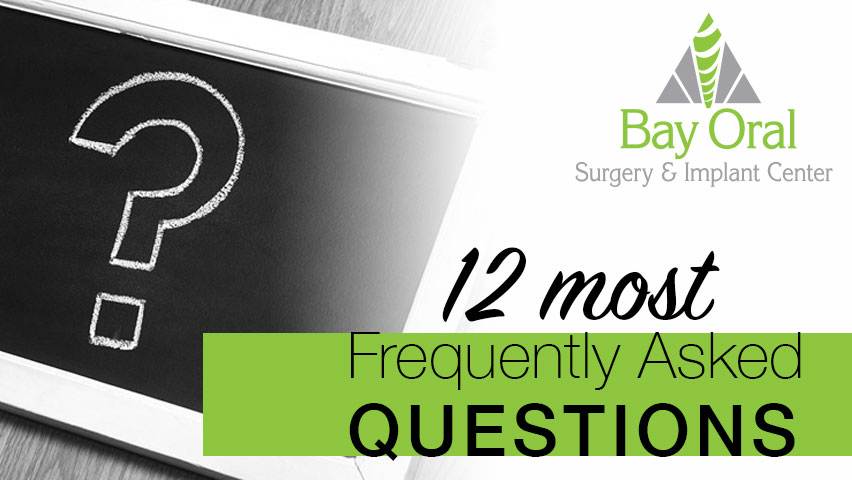
Here at Bay Oral, we recognize that many of our patients don’t necessarily love going to the dentist so the thought of having oral surgery can be scary. That uncertainty is normal however, we would like to dispel some of those fears and answer the most common questions patients ask when considering oral surgery.
How do I know if I need oral surgery?
Oral and Maxillofacial surgeons are specially trained in surgery on gums, teeth, jaw, face and head. Most commonly your dentist will make a recommendation for you to see one of our surgeons to ensure you have the best care possible, whether you need your wisdom teeth removed or are dealing with tooth loss or facial trauma. If you think you are in need of oral surgery, schedule an appointment for a consultation today.
How long is oral surgery?
The length of the surgery depends on the type and the extent of the procedure.
Wisdom tooth removal typically last between 30 – 90 minutes.
The dental implant process can vary widely dependent on whether you need bone grafting to prepare the jaw and how long it takes for the artificial root to bond and heal with your natural jaw bone.
How long is recovery?
Recovery from dental surgery really depends on the patient and the type of surgery they are undergoing. Bleeding is normal after a tooth extraction and will usually stop within 24 hours. You can expect swelling to be completely gone within 7-10 days. We recommend that you rest for at least two days after an oral surgery to allow your body to heal and reduce the risk of dry socket. For more recovery information see our post operative instructions.
Are there foods that I need to avoid after the surgery?
Softer foods are easier to eat post-surgery (ex. jello, pudding, applesauce, ice cream, yogurt, cottage cheese, mashed potatoes, noodles, etc). Some procedures will require a no-chew diet, you will be been given instructions by your Doctor if this is the case.
Is it alright to eat before the scheduled surgery?
In general we ask all patients to abstain from eating for at least 6 hours before their appointment. This is especially important if you are undergoing general anesthesia or IV sedation. Find out more about dental surgery preparation, here.
Will I need to be under anesthesia for oral surgery?
All of our procedures at Bay Oral are surgical in nature and will require some type of anesthesia – check out our post “Dental Anesthesia / Sedation and You” to learn more.
Why did my dentist send me to an oral surgeon just to remove a tooth? Can’t he do that?
General dentists can and sometimes do perform tooth extractions, however depending on the type of impaction or if the procedure requires a surgical approach, oral surgeons are the most qualified to perform this procedure. We not only specialize in this procedure and remove thousands of teeth every year, we also provide sedation so our patients have an easier, safer and more comfortable experience.
What are dental implants?
Dental Implants are titanium posts surgically placed into the jaw bone, beneath the gums, creating a stable foundation to attach a prosthetic tooth. The implant replaces the missing root from a lost or extracted tooth.
What are some of the benefits of dental implants?
Dental Implants help preserve facial structure, preventing bone deterioration that occurs when teeth are missing. Dental implants provide a foundation for replacement teeth that look, feel, and function like natural teeth. When you choose dental implants, you regain the ability to eat your favorite foods, and smile with confidence knowing that your teeth appear natural and healthy.
Is the implant procedure painful?
Most people will attest that the dental implant procedure produces minimal discomfort due to the use of anesthetics. Patients often indicate that implants are less painful than extractions.
How long do implants last?
Dental implants commonly last longer than other methods of replacing teeth like bridges and dentures, however, the longevity of dental implants depends on a number of things; how well you take care of them, how much you avoid biting and chewing on hard objects or opening things with your teeth, and your overall health. In general, more than 90% of implants will still be functional after 10 years.
What is involved with taking care of dental implants?
Although an implant cannot decay like a natural tooth it is just as important to keep it clean and to remove the harmful bacteria buildup that can cause infection (implantitis) around the implant. Continue your regular dental cleanings for the best and most long-lasting success.
